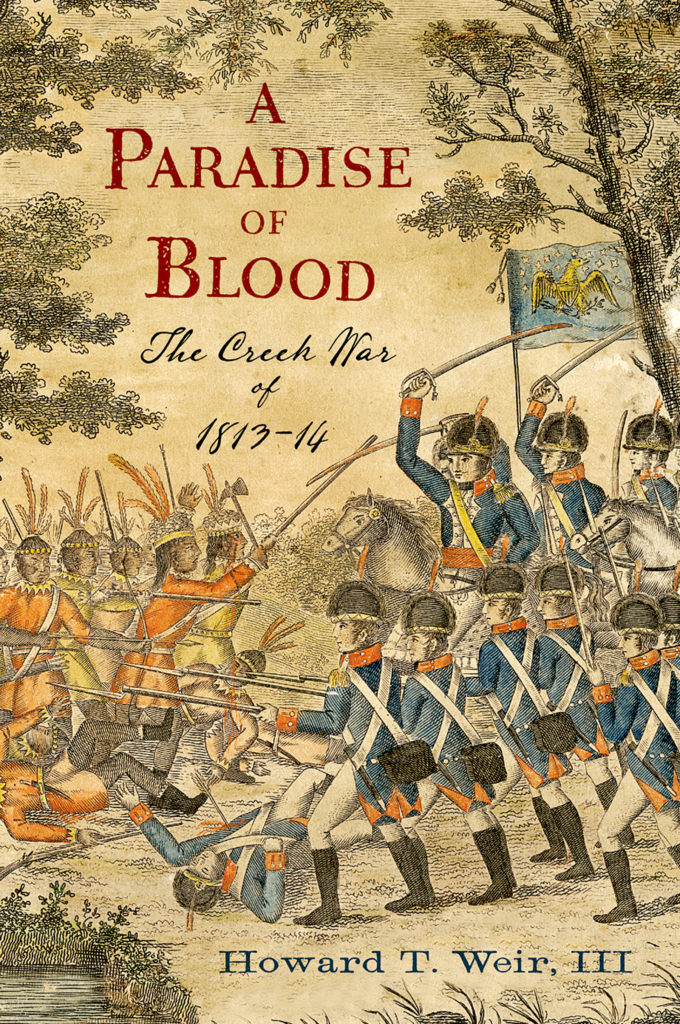

A Paradise of Blood
The Creek War of 1813–14
Select Your Format:
Paperback$34.95eBook
$30.00 Add to Cart Save 25% on every book by joining our Book Club


Select Your Format:
PaperbackThe War for an Idyllic Wilderness That Brought Andrew Jackson to National Prominence, Transformed the South, and Changed America Forever
In 1811, a portion of the Creek Indians who inhabited a vast area across Georgia, Alabama, and parts of Florida and Mississippi, interpreted an earth tremor as a sign that they had to return to their traditional way of life. What was an internal Indian dispute soon became engulfed in the greater War of 1812 to become perhaps the most consequential campaign of that conflict. At immediate stake in what became known as the Creek War of 1813–14 was whether the Creeks and their inconstant British and Spanish allies or the young United States would control millions of acres of highly fertile Native American land. The conflict’s larger issue was whether the Indian nations of the lower American South—the Creek, Cherokee, Choctaw, and Chickasaw—would be able to remain in their ancestral homes.
Beginning with conquistador Ferdinand DeSoto’s fateful encounter with Indians of the southeast in the 1500s, A Paradise of Blood: The Creek War of 1813–14 by Howard T. Weir, III, narrates the complete story of the cultural clash and centuries-long struggle for this landscape of stunning beauty. Using contemporary letters, military reports, and other primary sources, the author places the Creek War in the context of Tecumseh’s fight for Native American independence and the ongoing war between the United States and European powers for control of North America. The Creek War was marked by savagery, such as the murder of hundreds of settlers at Fort Mims, Alabama—the largest massacre of its kind in United States history—and fierce battles, including Horseshoe Bend, where more Indian warriors were confirmed killed than in any other single engagement in the long wars against the Indians. Many notable personalities fought during the conflict, including Andrew Jackson, who gained national prominence for his service, Sam Houston, War Chief William Weatherford, and Davy Crockett. When the war was over, more than twenty million acres had been added to the United States, thousands of Indians were dead or homeless, and Jackson was on his way to the presidency. The war also eliminated the last effective Native American resistance to westward expansion east of the Mississippi, and by giving the United States land that was ideal for large-scale cotton planting, it laid the foundation for the Civil War a generation later. A Paradise of Blood is a comprehensive and masterful history of one of America’s most important and influential early wars.

Howard T. Weir, III has a BA in history from the University of California at Berkeley, an MFA from Hollins University, and a JD from the University of Alabama School of Law. He studied creative writing under James Dickey, George Garrett, and Lillian Hellman.
“Weir has written the definitive account of the conflict.”—Historians Manifesto
“A model operational analysis of irregular warfare.”—Publishers Weekly
“A remarkable addition to Alabama history . . . beyond impressive.”—Edwin G. Bridges, Director Emeritus of the Alabama Department of Archive and History
“In this first comprehensive history of the Creek War of 1813–1814, Weir offers readers a lively, engaging, and factually reliable narrative on a fascinating time in early America.”—Gregory A. Waselkov, University of South Alabama